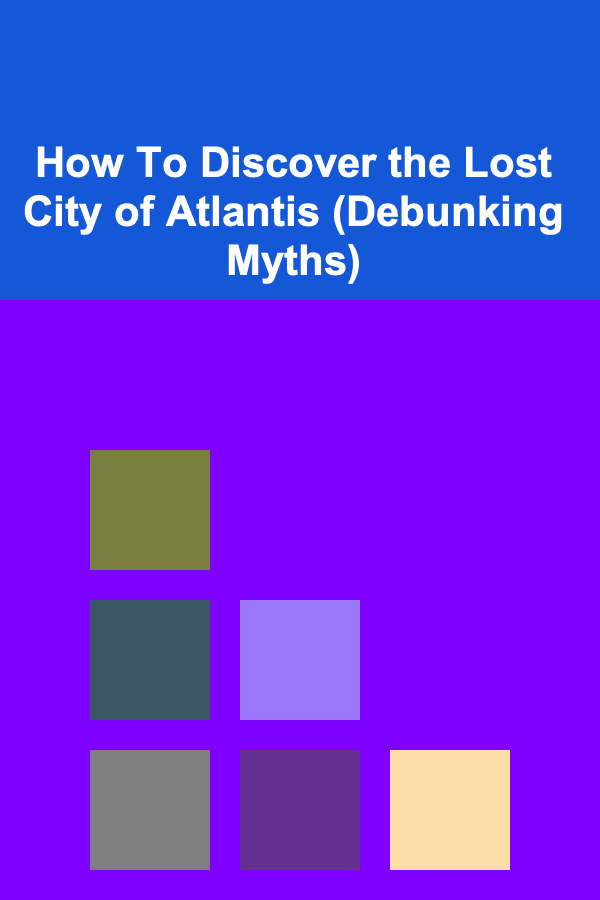
How To Discover the Lost City of Atlantis (Debunking Myths)
ebook include PDF & Audio bundle (Micro Guide)
$12.99$6.99
Limited Time Offer! Order within the next:

The lost city of Atlantis has captivated imaginations for millennia. From Plato's original description to countless books, films, and games, the legend of a technologically advanced island nation swallowed by the sea persists. But separating fact from fiction, and understanding how a genuine scientific pursuit to locate potential historical origins might proceed, requires a rigorous approach that actively debunks popular myths and embraces interdisciplinary research.
This article will explore the persistent myths surrounding Atlantis and propose a more grounded, scientifically plausible strategy for its potential discovery. Instead of relying on pseudoscientific claims and unsubstantiated psychic readings, we will focus on geological, archaeological, oceanographic, and historical evidence, highlighting the importance of critical thinking and rigorous methodology.
The Allure of Atlantis: A Brief History
The story of Atlantis originates with Plato, specifically in his dialogues Timaeus and Critias (c. 360 BC). Plato describes Atlantis as a powerful naval confederation located "beyond the Pillars of Hercules" (generally understood as the Strait of Gibraltar). This island nation, possessing advanced technology and a highly organized society, attempted to conquer Athens but was ultimately defeated. As punishment for their hubris and aggression, Atlantis was said to have been destroyed by earthquakes and floods, sinking beneath the ocean in a single day and night.
It's crucial to understand Plato's purpose in creating the Atlantis narrative. Most scholars believe that Plato was using Atlantis as an allegorical tool to illustrate his philosophical ideas about ideal societies, political systems, and the consequences of unchecked power and corruption. Atlantis served as a cautionary tale, a stark contrast to Plato's vision of a just and virtuous state.
Debunking the Myths: Setting the Record Straight
The problem with the Atlantis story isn't its entertainment value, but the widespread acceptance of fantastical claims often associated with it. Many interpretations stray far from Plato's original text, incorporating elements of pseudoscientific speculation, New Age beliefs, and outright hoaxes. Before we can even begin a credible search, we must address and debunk these pervasive myths.
Myth 1: Atlantis Possessed Advanced Technology Far Beyond Any Known Ancient Civilization
This is one of the most persistent and misleading claims. Atlantean technology is often depicted as being powered by crystals, harnessing unknown energies, or even possessing flying machines and laser weapons. This vision is based on modern science fiction tropes rather than any evidence from Plato's account.
Debunking: Plato described Atlantis as having a sophisticated military and naval power, but within the realm of what was plausible for the era. He mentions bronze weapons, chariots, and advanced shipbuilding. There is absolutely no basis for attributing futuristic technologies to Atlantis. Furthermore, the archeological record consistently demonstrates a gradual progression of technological development, not sudden leaps caused by a lost super-civilization. Attributing unexplained phenomena to Atlantis also stifles genuine scientific inquiry and diverts attention from legitimate areas of research.
Myth 2: Atlantis Was Located in a Specific, Identifiable Location Already "Discovered"
Numerous locations have been proposed as the site of Atlantis, including the Azores, the Canary Islands, Antarctica, the Bimini Road, and even the Sahara Desert. Proponents often point to vague geological formations or anecdotal evidence as "proof" of Atlantis's existence in these locations.
Debunking: The proliferation of "Atlantis found!" claims is a testament to the enduring appeal of the myth, but lacks scientific rigor. Plato specifically placed Atlantis "beyond the Pillars of Hercules," which suggests the Atlantic Ocean. However, this is just one detail in a largely fictional narrative. Many proposed locations have been thoroughly investigated and debunked by geologists and archaeologists. For example, the "Bimini Road" is a naturally occurring rock formation, not a man-made structure. The Sahara Desert was once a more fertile area, but the geological evidence does not support the existence of a large, advanced civilization that was suddenly submerged. The Azores and Canary Islands are volcanic islands whose geological history is well-understood and doesn't fit the Atlantis narrative. Focusing on pre-determined locations without concrete evidence is a flawed approach.
Myth 3: Psychics or Mystics Can Locate Atlantis Through Spiritual Means
Throughout history, various psychics and mystics have claimed to have located Atlantis through psychic visions, astral projection, or channeling Atlantean spirits. These claims often involve elaborate descriptions of Atlantean society, history, and technology, which are presented as factual information.
Debunking: Psychic readings and mystical experiences are subjective and cannot be verified through scientific methods. There is no credible scientific evidence to support the existence of psychic abilities or the accuracy of psychic predictions. Relying on such claims in a scientific investigation is inherently unreliable and unscientific. Such claims are often motivated by profit or attention-seeking rather than a genuine desire to uncover the truth. Furthermore, many of these "visions" contradict each other, further undermining their credibility.
Myth 4: Atlantis's Destruction Was a Sudden, Catastrophic Event That Occurred Exactly as Plato Described
Many believe that Atlantis was destroyed in a single day and night by earthquakes and floods, exactly as described by Plato. This leads to searches for sunken cities that were instantly submerged and perfectly preserved.
Debunking: Plato's account is a literary creation, not a historical record. Even if there were a kernel of truth behind the Atlantis story, it's highly unlikely that the destruction occurred exactly as he described. Geological events, even catastrophic ones, typically unfold over longer periods of time. Furthermore, the ocean is a highly corrosive environment. Objects submerged for thousands of years would be heavily damaged or destroyed, not perfectly preserved. Searching for a pristine, perfectly preserved city exactly matching Plato's description is unrealistic. Any potential historical basis for Atlantis would likely involve a more gradual decline or destruction, and the surviving evidence would be fragmented and difficult to interpret.
Myth 5: Ancient Maps and Texts "Prove" the Existence and Location of Atlantis
Various maps and texts, often of dubious origin or misinterpretations of genuine historical documents, are presented as irrefutable proof of Atlantis. The Piri Reis map and Ignatius Donnelly's interpretations of ancient Egyptian texts are common examples.
Debunking: The Piri Reis map, for example, is a fascinating historical artifact, but its depiction of Antarctica is based on conjecture and not accurate mapping of a pre-ice age continent. Ignatius Donnelly's work, while influential in popularizing the Atlantis myth, relies on flawed interpretations and selective use of evidence. Many so-called "ancient texts" are either forgeries or misinterpretations of genuine historical documents. Critical analysis of the source material, historical context, and the author's biases is crucial when evaluating such claims. Claims should be verified by multiple independent sources and corroborated by archeological or geological evidence before being accepted as fact.
A Scientific Approach to Locating Potential Historical Origins
While accepting Plato's Atlantis at face value is unproductive, completely dismissing the possibility of a historical origin is also unwise. A more rational approach involves shifting the focus from finding a "lost city" to investigating potential historical events and civilizations that may have inspired Plato's narrative. This requires a multidisciplinary approach that combines:
1. Geological and Oceanographic Research
This involves studying geological formations, tectonic activity, and sea-level changes in regions that may have been relevant to Plato's description, particularly the Mediterranean and Atlantic regions. Specifically, research should focus on:
- Submerged landscapes: Mapping and surveying submerged continental shelves to identify potential areas of past human habitation. Technologies like sonar, multi-beam echo sounders, and remotely operated vehicles (ROVs) are crucial for this task.
- Volcanic activity: Investigating volcanic eruptions and seismic events that may have caused widespread destruction and coastal changes. Studying sediment cores can provide valuable data on past volcanic activity and its impact on coastal populations.
- Tsunami deposits: Identifying and analyzing tsunami deposits to understand the scale and frequency of past tsunamis, which could have devastated coastal settlements.
- Sea-level fluctuations: Reconstructing past sea-level changes to identify areas that were once above sea level but are now submerged. Analyzing fossilized shorelines and submerged archaeological sites can provide crucial data.
The use of advanced dating techniques (radiocarbon dating, uranium-thorium dating) is essential for establishing accurate timelines of geological and archaeological events.
2. Archaeological Investigations
This entails excavating and analyzing archaeological sites in coastal regions that show evidence of advanced civilization during the relevant time period (Bronze Age Mediterranean). This includes:
- Minoan Civilization: The Minoan civilization on Crete, which flourished from around 2700 to 1450 BC, bears some striking similarities to Plato's description of Atlantis. They possessed advanced technology (including plumbing and irrigation), a sophisticated navy, and a centralized government. The eruption of the Thera volcano (Santorini) around 1628 BC is thought to have devastated Minoan civilization, potentially contributing to its decline and eventual collapse. Further excavation and analysis of Minoan sites are crucial.
- Mycenaean Civilization: The Mycenaean civilization, which succeeded the Minoans, also possessed significant military power and a highly organized society. Investigating Mycenaean sites and their interactions with other Mediterranean cultures can provide valuable insights into the political and economic landscape of the time.
- Other Mediterranean Civilizations: Exploring other Bronze Age civilizations in the Mediterranean, such as the Egyptians, Hittites, and Canaanites, to understand their technological advancements, trade networks, and political rivalries.
- Submerged Archaeological Sites: Systematically surveying and excavating submerged archaeological sites along the Mediterranean coast, focusing on areas that may have been affected by earthquakes, tsunamis, or sea-level changes.
Analyzing artifacts, architectural remains, and skeletal remains can provide valuable information about the daily life, technology, and beliefs of these ancient civilizations.
3. Historical and Textual Analysis
This involves critically examining historical texts and accounts from the relevant time period, including Plato's dialogues, to identify potential sources of inspiration for the Atlantis story. This includes:
- Deconstructing Plato's Narrative: Analyzing Plato's Timaeus and Critias in their historical and philosophical context, paying close attention to his use of allegory, symbolism, and rhetorical devices.
- Investigating Potential Historical Parallels: Identifying historical events and civilizations that may have served as models for Atlantis, such as the Minoan civilization, the destruction of Helike, or the Trojan War.
- Examining Ancient Geographic Knowledge: Analyzing ancient maps and geographical texts to understand how ancient civilizations perceived the world and their place in it.
- Studying Ancient Languages and Mythology: Examining ancient languages and mythological traditions to identify potential connections between Atlantis and other legendary lands or figures.
This requires careful attention to the biases and limitations of ancient sources, as well as a deep understanding of the historical and cultural context in which they were written.
4. Interdisciplinary Collaboration
The search for the potential historical origins of Atlantis requires a collaborative effort involving geologists, oceanographers, archaeologists, historians, linguists, and other experts. Sharing data, expertise, and perspectives is essential for piecing together a complete picture.
- Data Sharing and Integration: Creating a centralized database to store and share geological, archaeological, and historical data related to the Atlantis question.
- Joint Research Projects: Encouraging collaborative research projects that bring together experts from different disciplines to investigate specific aspects of the Atlantis mystery.
- Open Communication and Peer Review: Promoting open communication and peer review to ensure the rigor and validity of research findings.
- Public Outreach and Education: Engaging the public in the Atlantis debate through educational programs, documentaries, and museum exhibits.
This interdisciplinary approach is crucial for overcoming the limitations of any single discipline and for generating new insights and perspectives.
Caveats and Realistic Expectations
Even with a rigorous scientific approach, the search for the historical origins of Atlantis may not yield definitive results. It's important to acknowledge the limitations of the available evidence and to avoid drawing hasty conclusions. We should be prepared for the possibility that Atlantis is purely a fictional creation of Plato, or that any historical basis is so heavily embellished that it is impossible to reconstruct accurately. Furthermore, the ocean is a vast and challenging environment, and the cost of underwater exploration can be prohibitive.
The goal should not be to definitively "prove" the existence of Atlantis as described by Plato, but rather to use the Atlantis myth as a catalyst for exploring the history and archaeology of the Mediterranean and Atlantic regions. Even if we never find a "lost city," the process of searching can lead to valuable discoveries about ancient civilizations, geological processes, and human history.
The Importance of Critical Thinking
The enduring appeal of the Atlantis myth highlights the importance of critical thinking and skepticism when evaluating extraordinary claims. We must be able to distinguish between credible evidence and speculation, between scientific findings and pseudoscientific beliefs. The Atlantis story serves as a valuable case study for understanding how myths are created, perpetuated, and used to promote various agendas.
By embracing a rigorous scientific approach and debunking the pervasive myths surrounding Atlantis, we can move beyond wishful thinking and engage in a more productive and intellectually honest exploration of the past. This approach will not only help us understand the potential historical origins of the Atlantis myth but also enhance our knowledge of ancient civilizations, geological processes, and the human condition.
The quest to understand the Atlantis story, therefore, becomes a journey into the depths of human curiosity, a test of our critical thinking skills, and an opportunity to learn more about ourselves and the world around us.
In conclusion, discovering the potential historical origins of Atlantis requires discarding fantastical myths and embracing a rigorous, interdisciplinary scientific approach. While definitive proof may remain elusive, the journey itself offers invaluable insights into ancient civilizations, geological processes, and the enduring power of human imagination.

How to Make Money Online as a Translator: 10 Actionable Ideas
Read More
How to Set Up a Meeting Area in Your Home Office
Read More
The Performance Marketing Manager's Playbook: Strategies for Data-Driven Success
Read More
How to Master Cake Pops and Cake Balls
Read More
How To Compliment Someone in Another Culture
Read More
Understanding Orbital Mechanics: A Deep Dive
Read MoreOther Products

How to Make Money Online as a Translator: 10 Actionable Ideas
Read More
How to Set Up a Meeting Area in Your Home Office
Read More
The Performance Marketing Manager's Playbook: Strategies for Data-Driven Success
Read More
How to Master Cake Pops and Cake Balls
Read More
How To Compliment Someone in Another Culture
Read More